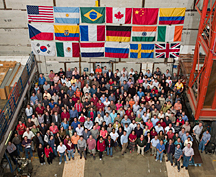- Number 316 |
- July 19, 2010
DZero tries to beat the odds
Some of the 500 scientists from 19
countries who are members of the
DZero collaboration. (Click image for
larger display)
According to the Standard Model of particle physics, the collider experiments at DOE’s Fermi National Accelerator Laboratory should never observe certain types of subatomic processes. But for a dedicated group of experimentalists, the word “never” just raises the stakes. The observation of one of these forbidden processes could open the window to a great discovery and change our understanding of the fundamental laws that govern matter and energy.
To find signs of a theory known as Supersymmetry—a proposed extension to the Standard Model—the DZero collaboration at Fermilab is looking for “forbidden” processes known as flavor changing neutral currents. For their latest analysis, submitted to Physics Letters B, DZero scientists looked for the unlikely event in which an up quark or charm quark emits a gluon and turns into a top quark. But even after sifting through billions of collisions, scientists did not find any evidence for the process; instead, the large set of collision data provided by the Tevatron collider allowed scientists to nearly double the exclusion limits obtained from the last such search.
Given that the observation of this process could revolutionize our understanding of matter and energy, it’s a sure bet that the DZero physicists will try again next year, when they’ll sift through an even bigger set of collision data.[Kurt Riesselmann, 630.840.5681,
kurtr@fnal.gov]

